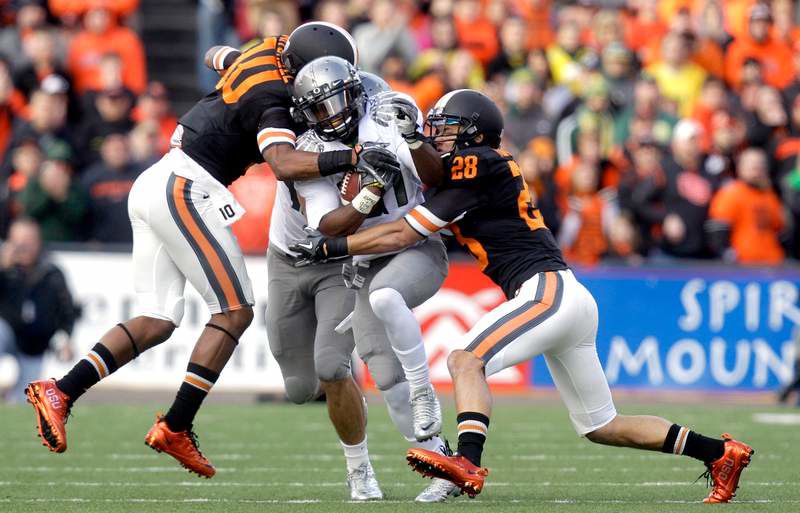Ducks, Beavers look back before Civil War
Published 4:00 am Friday, November 25, 2011

- Oregon running back Kenjon Barner is tackled by Oregon State safety Lance Mitchell (10) and safety Suaesi Tuimaunei (28) in the first half of last year's Civil War. Oregon and Oregon State play on Saturday.
Oregon State coach Mike Riley is doubling as a history teacher this week in advance of the Civil War.
The Beavers (3-8, 3-5 Pac-12) are studying the storied rivalry against Oregon — on top of practice — as a way to savor their final game of the season. The lesson is likely heavy on Oregon State wins.
“There is so much history that it’s fun to show them this. It’s a unique part of the deal,” Riley said.
For the second-straight season, Oregon State is not headed for a bowl game. So essentially, the Civil War is their bowl.
But it will be a challenge.
Ninth-ranked Oregon (9-2, 7-1) was chasing a bid at the national championship when the team was derailed last Saturday in a 38-35 loss at home to USC. The Ducks can still clinch the Pac-12 North Division with a victory over Oregon State and go to the league’s first championship game.
Win there, and it’s on to the Rose Bowl. But the Beavers come first.
“It means a lot more now, since we lost the last one,” Oregon running back LaMichael James said about Saturday’s game at Autzen Stadium. “When you lose a game you can’t wait to play the next one.”
Oregon Coach Chip Kelly leaves the Civil War tutoring to his upperclassmen.
“Our players do the educating from that standpoint,” he said. “I think they’ve done a good job in terms of how important this game is.”
The rivalry started in 1894, when Oregon State — then Oregon Agricultural College — won 16-0. In 1916, Oregon defeated OAC 27-0, giving the Ducks a 6-0-1 regular-season record and their first-ever appearance in the Rose Bowl, where they defeated Penn 14-0.
The game was largely referred to as the “State Championship” or the “Oregon Classic” in the early days. The Civil War nickname didn’t take off until the 1930s.
The 1933 game was notable because of the so-called “pyramid play.” Oregon’s extra-point attempt was blocked by Clyde Devine, who was lifted in the air by his teammates. The Ducks defeated Oregon State 13-3, and the play later banned by the NCAA.
In 1962, the Beavers and Heisman Trophy-winning quarterback Terry Baker trailed 17-6 at halftime but dominated the second half. Baker’s 13-yard touchdown pass to Danny Espalin in the fourth quarter sealed a 20-17 victory.
A week after defeating top-ranked USC and O.J. Simpson 3-0 on a muddy November day in 1967, the Beavers’ famous “Giant Killers” came back from a 10-0 deficit to win the first Civil War at the new Autzen Stadium, 14-10.
The Toilet Bowl, a 0-0 tie on a blustery and wet day in November 1983, featured 11 fumbles, five interceptions and four missed field goals.
“It was almost like neither team wanted to win,” Oregon coach Rich Brooks was quoted as saying. It would go down as the last scoreless college football game.
The Ducks entered the 1994 Civil War tied with Southern Cal for the Pac-10 championship and needed a win to clinch their first Rose Bowl berth since 1957. Trailing 13-10, Danny O’Neil drove the team 70 yards, hitting Dino Philyaw for a 19-yard touchdown with 3:47 to play, giving Oregon a 17-13 victory.
In 2000, the No. 8 Beavers denied the fifth-ranked Ducks a trip to Pasadena with a 23-13 victory. Joey Harrington threw five interceptions in the game and cried in the aftermath.
Last year, James and fellow running back Kenjon Barner each ran for two touchdowns in a 37-20 victory in Corvallis, Oregon’s last hurdle on the way to the BCS championship game.
Riley grew up in Corvallis and his father, Bud, was an assistant Beavers coach, so he’s seen his share of Civil Wars.
Kelly, who is from New Hampshire, joked that he learned about the rivalry from longtime Ducks’ broadcaster Jerry Allen, so he was doing a little Civil War homework just like the Beavers this week.
“I gotta quiz on Friday,” he laughed, “so we’ll see how I do.”






